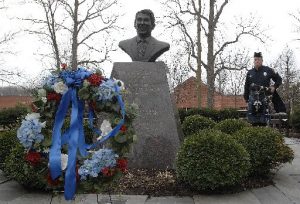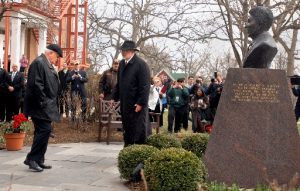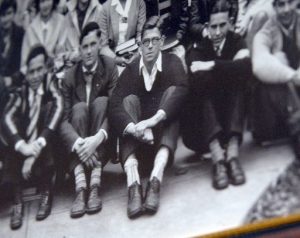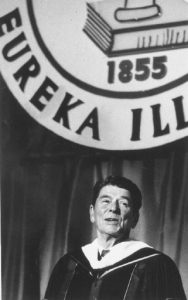Reagan’s ‘quintessential’ story began at Eureka College
By Lenore Sobota — July 12, 2018
Ted Kerrn of Bloomington stands at attention after playing bagpipes during the wreath-laying ceremony in the Eureka College Ronald W. Reagan Peace Garden to honor First Lady Nancy Reagan in March 2016. (Photos provided by the Pantagraph of Bloomington)
Illinois may be known as the Land of Lincoln, but it’s another president with Illinois roots who offers lessons to which people today can more easily relate, say officials of Ronald Reagan’s alma mater.
Reagan graduated from Eureka College in 1932. He went on to become a sports broadcaster, movie and television actor, governor of California and the 40th president of the United States.
“The Reagan story is the quintessential Illinois story,” said Michael Murtagh, the college’s vice president for institutional advancement. “He is a person who came from small-town Illinois and made a difference in the world.”
As noted by Mike Thurwanger, head of the Reagan Leadership Program at the college: “One of the things he offers is the understanding that an individual from humble beginnings can rise to a position where he has an impact on the world.”
While not downgrading the importance of Abraham Lincoln, Murtagh notes: “Lincoln grew up in a log cabin. … People can’t relate to that.”
Reagan, on the other hand, faced financial struggles, went to college on a “needy student” scholarship while also working, and had a father with a drinking problem, said Murtagh.
“His life struggles exemplify many of the life struggles our students still face,” he said. “He is proof that you can overcome that kind of thing. Reagan’s life is something students can relate to.”
Thurwanger said Reagan’s “Midwestern and Illinois values colored the way he approached things” and even some of his critics would like to see a return to some of what he was known for, such as his ability to “work across the aisle, which we don’t seem to be doing today.”
Signs of Reagan’s life both before and after his graduation remain on campus — and not just in the Reagan Museum that opened in 1994 in the Cerf Center.
There is the chapel where Reagan gave his first speech as a college freshman.
“The chapel hasn’t changed a lot,” said Murtagh “The pews have been removed but the feel is still there.”
But for Murtagh, “The Reagan Peace Garden stands out for me.”
Dedicated in May 2000, the garden contains a bronze bust of a smiling Reagan by artist Lonnie Steward and a 5-by-4-foot section of the Berlin Wall, given by the Federal Republic of Germany.
Around the base that holds the bust are quotes from Reagan’s 1982 commencement address, at which he outlined his plans for seeking peace with the Soviet Union and for strategic arms reduction, with a goal of “dismantling the nuclear menace.”
“Peace is not the absence of conflict but the ability to cope with conflict by peaceful means,” reads one of the quotes.
The impact of Reagan teaming with Soviet President Mikhail Gorbachev to end the Cold War is not lost on Thurwanger and Murtagh.
“Both of us are Cold War veterans,” said Thurwanger, noting that he and Murtagh each served in the military for 20 years. “I’m not sure the current generation has a full grasp of his importance” in ending the Cold War.
A plaque in front of the section of the Berlin Wall contains the famous quote from Reagan’s 1987 visit to West Berlin: “Mr. Gorbachev, tear down this wall.”
Gorbachev dismissed the role that Reagan played in the eventual dismantling of the wall. But during a visit to Eureka College in 2009, the former Soviet leader said, “When all is said and done, he was a great man.”
Gorbachev is among many dignitaries, including former Supreme Court Justice Sandra Day O’Connor, who have visited Eureka College over the years because of the Reagan connection and the efforts of the Ronald Reagan Society at Eureka College to preserve his legacy.
Another way that legacy is continued is through the Reagan Leadership Program, which provides scholarships and mentorships to students.
“The idea is to develop their leadership potential,” said Thurwanger. “We use a servant-leader model,” which emphasizes using skills to help others become leaders themselves.
He added, “Our goal is developing all students so they leave as leaders.”
Speaking at the 1982 commencement, 50 years after his own graduation, Reagan said, “Everything that’s been good in my life began here.”
It was a phrase he repeated on several occasions, but it wasn’t just talk.
It was at Eureka College that Reagan gave his first speech as a 17-year-old freshman. He called for a vote of the student body on a student strike over a campus dispute with the college president and the board of trustees — a board on which he would later serve as an alumnus
A double-major in economics and sociology, Reagan also competed on the football and swim teams, acted in 14 plays, served in student government and was a fraternity member.

Mikhail Gorbachev, former Soviet Union president, left, and J. David Arnold, former Eureka College president, walk in the Ronald Reagan Peace Garden Friday, March 27, 2009.
Reagan admitted his involvement in athletics may have drawn attention away from academics. “Even now I wonder what I’d have accomplished if I’d studied harder,” he quipped in that 1982 commencement speech, during his first term in the White House.
But involvement in such multiple activities continues to be encouraged at Eureka.
Calling such involvement “a critical component” of Reagan’s education, Murtagh said, “Students more than ever need to be participants” to develop their leadership and communications skills.
As Reagan said in a 1982 interview with Pantagraph columnist Bill Flick: “One thing about a small school: You can’t hide. Students were drafted into those things and found horizons broadened and found themselves able to do things that they never would have attempted.”
Lenore Sobota can be reached at lsobota@pantagraph.com or on Twitter at @ph_sobota.
Editor’s note: The weekly Illinois Bicentennial series is brought to you by the Illinois Associated Press Media Editors and Illinois Press Association. More than 20 newspapers are creating stories about the state’s history, places and key moments in advance of the Bicentennial on Dec. 3, 2018. Stories published up to this date can be found at 200illinois.com.
—Reagan’s ‘quintessential’ story began at Eureka College–









